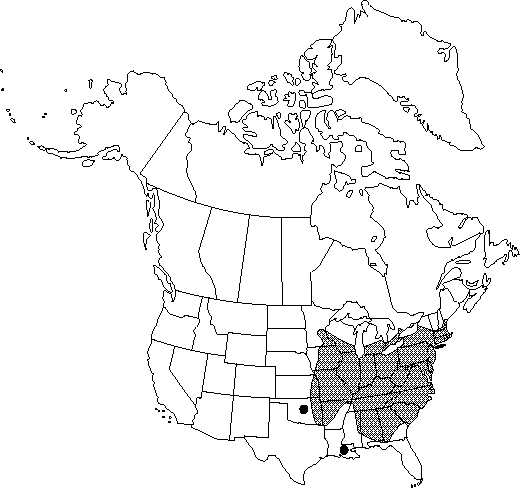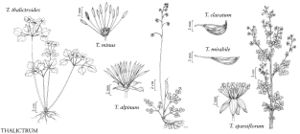Difference between revisions of "Thalictrum thalictroides"
Bull. Soc. Roy. Bot. Belgique 89: 319. 1957.
FNA>Volume Importer |
FNA>Volume Importer |
||
| Line 16: | Line 16: | ||
}} | }} | ||
|basionyms={{Treatment/ID/Synonym | |basionyms={{Treatment/ID/Synonym | ||
| − | |name= | + | |name=Anemone thalictroides |
|authority=Linnaeus | |authority=Linnaeus | ||
}} | }} | ||
|synonyms={{Treatment/ID/Synonym | |synonyms={{Treatment/ID/Synonym | ||
| − | |name= | + | |name=Anemonella thalictroides |
|authority=(Linnaeus) Spach | |authority=(Linnaeus) Spach | ||
| − | }}{{Treatment/ID/Synonym | + | }} {{Treatment/ID/Synonym |
| − | |name= | + | |name=Syndesmon thalictroides |
|authority=(Linnaeus) Hoffmannsegg | |authority=(Linnaeus) Hoffmannsegg | ||
| − | }}{{Treatment/ID/Synonym | + | }} {{Treatment/ID/Synonym |
| − | |name= | + | |name=Thalictrum anemonoides |
|authority=Michaux | |authority=Michaux | ||
}} | }} | ||
| Line 43: | Line 43: | ||
|elevation=0-300 m | |elevation=0-300 m | ||
|distribution=Ont.;Ala.;Ark.;Conn.;Del.;D.C.;Fla.;Ga.;Ill.;Ind.;Iowa;Kans.;Ky.;La.;Maine;Mass.;Mich.;Minn.;Miss.;Mo.;N.H.;N.J.;N.Y.;N.C.;Ohio;Okla.;Pa.;R.I.;S.C.;Tenn.;Vt.;Va.;W.Va.;Wis. | |distribution=Ont.;Ala.;Ark.;Conn.;Del.;D.C.;Fla.;Ga.;Ill.;Ind.;Iowa;Kans.;Ky.;La.;Maine;Mass.;Mich.;Minn.;Miss.;Mo.;N.H.;N.J.;N.Y.;N.C.;Ohio;Okla.;Pa.;R.I.;S.C.;Tenn.;Vt.;Va.;W.Va.;Wis. | ||
| − | |discussion=<p>In Thalictrum, T. thalictroides is unique in having umbelliform inflorescences and is therefore easy to identify. Based on this one distinction, many botanists still place it in the genus Anemonella. The leaflets, flowers, and fruits, however, are not unlike those of Thalictrum.</p><!-- | + | |discussion=<p>In <i>Thalictrum</i>, <i>T. thalictroides</i> is unique in having umbelliform inflorescences and is therefore easy to identify. Based on this one distinction, many botanists still place it in the genus Anemonella. The leaflets, flowers, and fruits, however, are not unlike those of <i>Thalictrum</i>.</p><!-- |
| − | --><p>The Cherokee used infusions prepared from the roots of Thalictrum thalictroides to treat diarrhea and vomiting (D. E. Moerman 1986).</p> | + | --><p>The Cherokee used infusions prepared from the roots of <i>Thalictrum thalictroides</i> to treat diarrhea and vomiting (D. E. Moerman 1986).</p> |
|tables= | |tables= | ||
|references= | |references= | ||
| Line 57: | Line 57: | ||
|rank=species | |rank=species | ||
|parent rank=section | |parent rank=section | ||
| − | |synonyms= | + | |synonyms=Anemonella thalictroides;Syndesmon thalictroides;Thalictrum anemonoides |
| − | |basionyms= | + | |basionyms=Anemone thalictroides |
|family=Ranunculaceae | |family=Ranunculaceae | ||
|phenology=Flowering spring (Mar–Jun). | |phenology=Flowering spring (Mar–Jun). | ||
| Line 68: | Line 68: | ||
|publication year=1957 | |publication year=1957 | ||
|special status=Endemic;Selected by author to be illustrated | |special status=Endemic;Selected by author to be illustrated | ||
| − | |source xml=https://jpend@bitbucket.org/aafc-mbb/fna-data-curation.git/src/ | + | |source xml=https://jpend@bitbucket.org/aafc-mbb/fna-data-curation.git/src/8f726806613d60c220dc4493de13607dd3150896/coarse_grained_fna_xml/V3/V3_227.xml |
|genus=Thalictrum | |genus=Thalictrum | ||
|section=Thalictrum sect. Anemonella | |section=Thalictrum sect. Anemonella | ||
Revision as of 18:15, 18 September 2019
Roots black, tuberous. Stems erect, scapose, 10-30 cm, glabrous. Leaves basal; petiole 10-30 cm. Leaf blade 2×-ternately compound; leaflets widely ovate or obovate to nearly rotund, apically 3-lobed, 8-30 mm wide, surfaces glabrous. Inflorescences umbels or flowers solitary, (1-)3-6-flowered; involucral bracts usually 3-foliolate, petiolate and opposite, or sessile with leaflets appearing to be whorls of 6 petiolate leaves, otherwise similar to basal leaves. Flowers: sepals not caducous, white to pinkish, showy, elliptic to obovate, 5-18 mm, longer than stamens; filaments narrowly clavate, 3-4 mm; anthers 0.4-0.7 mm. Achenes (4-)8-12(-15), short-stipitate; stipe 0.1-0.4 mm; body ovoid to fusiform, 3-4.5 mm, prominently 8-10-veined.
Phenology: Flowering spring (Mar–Jun).
Habitat: Deciduous woods, banks, and thickets
Elevation: 0-300 m
Distribution

Ont., Ala., Ark., Conn., Del., D.C., Fla., Ga., Ill., Ind., Iowa, Kans., Ky., La., Maine, Mass., Mich., Minn., Miss., Mo., N.H., N.J., N.Y., N.C., Ohio, Okla., Pa., R.I., S.C., Tenn., Vt., Va., W.Va., Wis.
Discussion
In Thalictrum, T. thalictroides is unique in having umbelliform inflorescences and is therefore easy to identify. Based on this one distinction, many botanists still place it in the genus Anemonella. The leaflets, flowers, and fruits, however, are not unlike those of Thalictrum.
The Cherokee used infusions prepared from the roots of Thalictrum thalictroides to treat diarrhea and vomiting (D. E. Moerman 1986).
Selected References
None.
